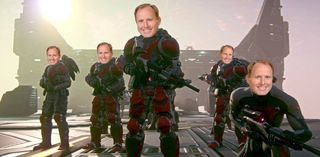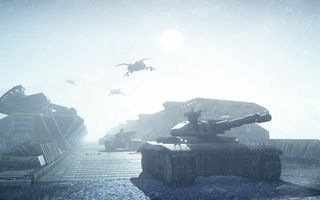SOE president John Smedley on PlanetSide 2's future, free-to-play and EverQuest Next

John Smedley is unusual among videogame executives for his outspoken Twitter presence and friendly, direct engagement with gamers. Maybe other suits should take note: the SOE president comes across as someone who understands and loves the games SOE makes and his responsiveness to players instils some considerable trust. If PlanetSide 2 wasn't perfect when it launched, gamers may feel reassured that with John Smedley at the helm SOE will continue to work towards that goal. Last night I got to speak to the big man about the future of PlanetSide 2, fighting in-game crime, free-to-play and the recent internally-revealed Everquest Next.
You're very active on social media – which is very unusually for the president of a major games publisher. How important is it to interact with your community?
I can't tell you enough how great it is to interact directly with fans. The best thing about Twitter is that it gives me the ability to respond directly to a person's questions. I decided a long time ago that I was going to use Twitter with my own voice and not be overly corporate about it – so I'll cuss occasionally, I'll call it like I see it, and... sometimes I get ripped for it, sometimes I don't but either way I don't mind. And I spend a decent amount of time on Twitter every day because I think it's important.
Do you expect more senior people within the industry to get more involved?
I see it all over the place. I watch the Twitter feeds of my industry friends like a hawk. I think that now people tend to use Facebook more for 'home stuff' but within the games industry people use Twitter to talk about work, and the trends that they're seeing – and you get to see all that in real time, so it's fun.
You've been quite outspoken on Twitter about rooting out cheats in Planetside. What steps are you taking to punish the wrong-doers, but maintain player individuality and freedom of expression?
I won't mince words: I hate cheaters. I don't like people who ruin the experience for everyone else, and – quite frankly – we see cheats as a threat to our game and a threat to our livelihood. So we take it very seriously, and we're not passive about it. The idea of someone ruining someone else's fun by cheating is something that really gets under my skin. It's something we're focusing a lot of resources on. We know cheaters are always going to be there, so it's our job to find them, root them out, and remove them from our game. And we do that every single day.
PC Gamer Newsletter
Sign up to get the best content of the week, and great gaming deals, as picked by the editors.
Do you have any kind of unusual punishment plan? Like Age of Conan's crucifixions for example?
It's funny that you mention that. There was a conversation we were having last night about how we plan to torment the people who were doing the cheating, and you can expect some rather amusing things to be happening in the next month or so as punishments within the game. Finding the ability to virtually tar and feather cheaters in game is quite entertaining for us, and we want to make an example of them in a big way. We want people to be genuinely embarrassed by it, but you can't go to such extremes that it becomes a badge of honour for them. So we're looking at doing some different things that will really piss the cheaters off.

You spoke to PC Gamer a year ago and mentioned that you have a three-year plan for Planetside, which you'd reveal post-release. Well, here we are – when are you going to tell us your plan?
That'll be shared in early January. What we're going to be doing is sharing it in six-month increments and – just like we did before release – we're going to be really listening to the players. We changed our entire subscription model based on their feedback – we put it out there, we wanted people to comment on it, and we changed it. We've changed so much about the game based on player feedback, so we're definitely going to do the same thing with our six month plans. What we're going to do is let people know a list of things we plan to do, and let them decide the order they want it done in, and – if they hate it – we'll just change it. It's that simple. Rather than giving it our full three-year plan, we're doing it in increments because that's how far ahead we can plan for content releases. The meta-game in Planetside 2 changes constantly – so trying to predict what the game will look and feel like three years from now is tough. We have this idea of the major beats we want to hit – like player owned bases – but in the shorter term we've got things like eSports we want to focus on and all kinds of cool new ways for players to fight wars. Players are paying the bills, so as far as I'm concerned that puts them in the driver's seat.
Planetside 2 is very tough to get into, but it does reward you if you stick with it. How important is it for you to provide an easier entry into the game in the future?
It's a very real issue for us. We've got a small team working on a tutorial for the game, because we didn't launch with one and – if we'd had a couple of extra months before release – we'd have put a tutorial in there. It is a tough game to learn, and we're proud of how deep it is, but I want every Battlefield or Call of Duty player to just get in there and know what to do straight away. Right now that isn't possible. It's likely we'll have that in the game by February, and we'll be working on attracting more new users after that. Our game is ten times more complicated than Battlefield 3, so our problem of introducing new people to game is significantly magnified.
It's a little like coming into a game a chess without someone to teach you. You could even read a book about chess and not really understand it. And we're exactly like that – Planetside 2 is a game as deep as chess, whereas I'd compare Battlefield 3 and Call of Duty to Checkers, on a complexity scale. That means we need to do a more efficient job of making the interface obvious, letting people understand the game intuitively, and the lack of a tutorial is a flaw in our design. If people don't understand the game right out of the gates, then we've done something wrong. It's a weakness and it's something we're trying to shore-up now.
Is free-to-play the future of games? Or will it sit alongside the standard £40 / $50 upfront model?
I think it'll sit next to $50 games for a long time. Let me give you an example to explain why. I love the Call of Duty series – but the single player campaign in that wouldn't work as free-to-play because it's enormously expensive to make. Now, could you separate the online from the single player game? Sure – and I think they can make a lot of money doing that. So, I think there are a lot of avenues where free-to-play doesn't work. One of those is anything that requires a huge download. If you look at some of the awesome Blu-ray games on PS3, like Uncharted – that game fills an entire Blu-ray. Realistically, that's not something you can make free-to-play because it takes so long and costs so much to download. So I think that barrier will be there for the foreseeable future, and I don't necessarily think that's a bad thing. We have loads of great free-to-play games out there at the moment, they're getting very high in quality with titles like League of Legends, Planetside 2 and DOTA 2 – I'm happy with the experiences I get out there. Quite frankly, I'm really happy with the experiences I get from free-to-play, and I don't play many other games with the exception of big releases like Call of Duty. So free-to-play is the future, but it's not the only future…
How do you strike a balance in free-to-play between giving people enough to enjoy the game, and actually selling enough content to be profitable?
I'll give you a good statistic: roughly 10% of the people on Planetside 2 actually spend money. It's very interesting to watch that balance. We designed the game from the start almost completely ignoring the F2P business model – we just wanted it to be fun. And the way we see it is that the 90% of players who don't pay are making the game fun for the 10% that do. So we look at the world in terms of how many people are playing the game, and not in terms of how many are paying. The players are content for one another, so the free players are just as important as the ones who are paying. You do have to design the game to ensure there's enough stuff to monetise – and we've done that – but you also need to make sure it isn't 'pay to win'. And we've done that too; I think we've found the right balance.

Do you think free-to-play has a bad reputation? And do you think titles like Planetside are going to change that?
The answer is yes. Much of the free-to-play model is coming over from Asia – and there were actually a stack of really good games that came over – but people just sort of dismissed them as just crappy. Most people didn't actually look at them. In Asia free-to-play has been prevalent for years, but now you're starting to see these games get popular all over the globe. League of Legends, for example, is the biggest game in the world right now. Period. And it's got 70 million registered users, 3 million people watching their championships, so free-to-play has actually been really good for 4-5 years now. But the reputation that it got from early in its life, especially in terms of social games. I think Zynga has done free-to-play a terrible disservice because many of their releases are monetisation products – not games. The truth is that now there are loads of really great free-to-play games, including ours, and I think Planetside is now a part of the hardcore community's free-to-play library.
So, the teams have just seen Everquest Next for the first time. How did that go down?
You know, I was really nervous about that. We showed it to them on Monday, and I couldn't sleep on Sunday night because I was scared. We've thrown out two previous designs of the game to go with something pretty crazy and… well, it's awesome. When the team saw it I could barely breath when they were watching it. But when I'd finished they were clapping and cheering – and these guys are gamers, so they're not afraid to call bullshit when they see us make a mistake. It's happened before. We've made mistakes, and the guys internally will call us on it every time. But they loved this, and we really felt vindicated that the way we're going with Everquest Next is the right way. I feel good about it. We're not trying to make WOW2 or Everquest 2.5 – we're making something that we think will define the next generation of MMOs.
The genre Everquest has occupied is pretty full now, so it must be very difficult to come up with something genuinely new.
Well, that's the trouble. Everybody has been making the same game since Everquest, really. If you look back, Ultima Online was out before us and really, all the current crop of MMOs are a lot like Everquest – they're in that style. They're great because the quality level has really improved, but nobody has really changed the game. Now, you saw it with League of Legends – Riot took DOTA and made it mainstream, so now everyone is playing that. You saw the same kind of thing in the Online RPG space. So, the previous designs we had for the next Everquest were cookie-cutter, they were 'me too'. We had some great, innovative things in there and they'd have been great games in themselves, but they wouldn't have been enough to keep an audience. We've had people playing Everquest for 13 years and we kept that in our mind as the main goal when making Everquest Next.
How are you feeling about your decision to pursue free-to-play as aggressively as you have done?
We definitely made the right call, and we like what we're doing. I think free-to-play is pure for one simple reason: people can vote right away. If they don't like your game they can just walk away because they didn't pay anything for it – it's the most democratic way to make games. And if they don't want to pay for it now, our hope is that they pay for it later, but they don't have to. So it makes me feel good that the games we make are being judged on their merit, not just how well we can market them or force them to play and pay like Zynga tried. It's pure and I love that.
Most Popular





